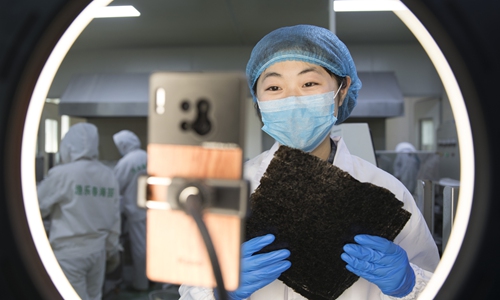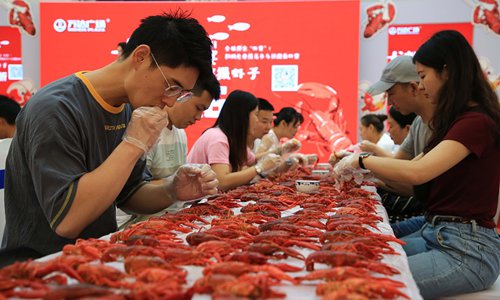‘Buying Hubei’ becomes nationwide campaign
By GT staff reporters Source:Global Times Published: 2020/4/17 0:48:40 Last Updated: 2020/4/16 22:48:40
Phenomenon shows Chinese cultural ingenuity, not replicable in other countries

An employee in an economic zone in Lianyungang, East China's Jiangsu Province sells seaweed via livestreaming on Tuesday. Online sales have become an important driving force for local governments to boost their economies, and the Ministry of Commerce said it will encourage more companies to use e-commerce to lift their sales. Photo:cnsphoto
More than two months ago, the streets of Wuhan were deserted and broader Hubei Province locked down to prevent the spread of the deadly coronavirus; two months later, people around the nation are emptying shelves and storage of everything the province has to offer - local hot noodles, ducks, crayfish and fruits - all aiming to pull the local economy back up.
"Buying Hubei" has become a nationwide campaign with participation from ordinary citizens, officials, celebrities and corporations. It combines some of the fastest-growing business models in China and the world - e-commerce and livestreaming promotion - with the country's robust internet, logistics infrastructure and technological prowess built over the past several decades. Above all, it inspired millions across the country who are motivated to spend money not for self-indulgence, but to extend a helping hand to their fellow countrymen in hardship. The result: Tens of millions of dollars were added to the local economy; tens of thousands of businesses and jobs are now saved, according to businesses and officials.
What's at play in China cannot be simply explained by economic theories; it goes way beyond any well-crafted, perfectly executed fiscal or monetary policy. It has much to do with the fabric of the Chinese society and the ingenuity of the Chinese people - making it a unique phenomenon for China that many other countries cannot simply replicate, businesses and analysts believe.
Nationwide campaign
The campaign kicked off on April 6 when Chinese livestreaming sensation Li Jiaqi, who once sold 150,000 lipstick sets within five minutes during an online sales session, together with television news anchor Zhu Guangquan, launched an online livestreaming session selling native Hubei products.
Nearly 11 million people watched the pair trying various local delicacies live and repeatedly referring viewers to links for placing orders. They helped sell more than 40 million yuan worth of Hubei-produced products within hours, according to media reports.
The pace picked up this week with more celebrities following suit. On Sunday, a session hosted by television news anchor Ouyang Xiadan and actor Wang Zulan attracted 122 million viewers and sold 40.14 million ($5.69 million) during the roughly two-hour session, according to some estimates.
On Monday, an online sales promotion hosted by another shopping sensation Viya and local Hubei actress Wu Qian drew over 127 million views and helped sell 61 million worth of products, according to Bai Jiale, a manager of an e-commerce business at livestream platform Kuaishou, which broadcast the session along with many other platforms, including the People's Daily app. During the session, stocks of duck snacks were emptied in matters of seconds.
"I was very surprised that our fans are so reliable. The stockpile we prepared fell far short," Viya, who has 18.9 million fans on Taobao and helped sell 110 million yuan worth of products from China's porvery-stricken areas in charitable sessions in 2019, told the Global Times.
She added that two more sessions have been planned. "Many have described our cooperation as a show of our moral principles and sense of duty. But that is over the top. I am just doing what I'm good at to help Wuhan, to help local companies open the market with livestreaming promotion and to help them resume work quickly."
That sentiment has resonated with millions across the country. Online, netizens have vowed to "gain three jin [1.5 kiograms] for Hubei" presumably by buying and eating foods from Hubei, a province well-known for its delicacies in the country.
Some said that they didn't have any medical skills to help Wuhan during the epidemic but they can show support by simply placing orders.

People enjoy the crayfish in Xiangyang, central China's Hubei Province on June 17, 2019. Over 1,000 crayfish were stripped and devoured in less than 20 minutes. Photo: VCG
Spending to support
"This is the best way of supporting Hubei I've ever seen after we have experienced such difficulties in combating the virus. It helps locals to quickly walk out of the shadow and overcome post-epidemic trauma," said a Beijing resident surnamed Chen, who is from Hubei.
She said she has been watching the livestreaming sessions and bought 1,500 yuan worth of products.
Seeing the overwhelming support from across the country, officials and businesses in the province also got to work.
Wu Zuyun, Party chief of Qianjiang in Hubei Province, has also turned himself into an online salesman for products from his city.
"I was completely moved and warmed by the active response from consumers all over the country in placing orders for Hubei products to support us, which fully reflects our valued Chinese tradition: When one falls into difficulty, all other parties come to help," Wu told the Global Times.
During a recent 1.5 hour-long session with Wu, 1.8 million netizens watched and 6,000 tons of crayfish, worth 220 million yuan, were sold. This has a potential to lift the crayfish industry in the city, which supported 150,000 jobs and generated an output of 42 billion yuan in revenue last year, he said.
Qi Fafa, general manager of Huashan Technology Co, based in Qianjiang, said that his company's daily supply of 20,000 packages of ready-to-eat crayfish have been cleared out within seconds over the past three days.
Liu Xiaoting, general manager of Dahankou, a brand of instant hot dry noodles in Wuhan, said that the company's orders have grown at least three times in the domestic market thanks to the online livestreaming promotion campaigns.
"The orders just exploded after the livestreaming campaign," Liu told the Global Times, "I've never seen anything work as well as this."
In total, Alibaba, the country's biggest e-commerce platform, said it has sold 20 million kilograms of agricultural products from Hubei, up 660 percent year-on-year. Another platform, jd.com, said that sales of fresh products from Hubei reached 1,400 tons in the first week of April.
Behind these skyrocketing sales figures are income and jobs for not just the sellers but many others in related sectors from packaging and storage to transport, said Liu Dingding, a Beijing-based internet sector analyst. "We can't simply stare at the transaction volume. We should also see the related sectors consumers pull up, the investment and profits. This value is immeasurable," he said.
However, despite of the effectiveness of livestreaming promotion, other countries that are also engulfed in this unprecedented public health and economic crisis might not be able to replicate this model, businesses and analysts said.
Many countries simply don't have the infrastructure and the market for something of this magnitude, analysts pointed out. China is home to the largest number of internet users, totaling around 840 million, 90 percent of whom use mobile phones; and 600 million customers use online payment methods, according to data from Statista. In 2019, total online sales jumped 16.5 percent year-on-year to over 10.63 trillion yuan. China has around 400,000 logistics companies with 50 million workers who ensure online orders are delivered on a timely basis.
"Whether its internet celebrities, product supply chains, technologies or capital behind it, this complete system came after years of work," Liu Dingding said, "That is very difficult for other countries to replicate. Livestreaming sales are a new economic model in China."
Posted in: SOCIETY